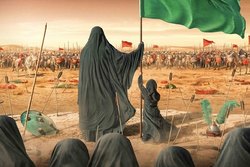Ashura Inspiring Liberation Struggles


In the contemporary era, Muslim freedom fighters and even such figures and leaders of freedom movements as Mahatma Gandhi have been inspired by Ashura.
IQNA asked seminary scholar Hojat-ol-Islam Seyed Ali Mirmousavi about the lessons of the event of Ashura. Excerpts from the interview are as follows:
IQNA: As the world is moving toward secularism and modern society and humanity is facing various crises such as those related to identity, ethics and spirituality, what lessons and messages does the Ashura uprising have for saving humanity and society from these crises?
Hojat-ol-Islam Mirmousavi: Ashura is a unique model for resistance against corrupt political systems and wrong ways of governance. In the contemporary era, Muslim freedom fighters and even such figures as Gandhi who led liberation movements, have been inspired by the event of Ashura. Ethics, valuing liberty and seeking freedom are manifested in the Ashura uprising. The lessons that Ashura has for modern humanity include those related to the ethics of resistance, valuing freedom and liberation. The uprising of Imam Hussein (AS) was in no way a violent move. Imam (AS) thought of every measure to prevent war and conflict and only resorted to the sword when he faced a choice between humiliation and martyrdom.
IQNA: How can the event of Ashura be analyzed based on the approach of Utopian idea?
Hojat-ol-Islam Mirmousavi: The issue of Utopia and ideology is an important one. Utopia means drawing an ideal situation and seeking a Utopia with the aim of criticism of the current situation and changing it to an ideal one. Utopia has always been among the concerns of revolutionary forces and from the heart of Utopia a revolution is always created. On the other hand there is ideology. Ideology is an interpretation that the power structure presents of the reality and is in line with justifying the use of power. As for the event of Ashura, there are both the Utopian view and the ideological view. In the first one, the uprising of Imam Hussein (AS) is a model for protest against the current situation and struggling against the established rule. The opponent is considered a Yazidi current and, therefore, confronting it is regarded as a duty. The ideological view, on the other hand, uses a kind of historical simulation the uprising of Imam Hussein (AS) to justify the status quo. It seems that both interpretations, while having different purposes, face the historical simulation error. In any case, the Utopian interpretation is definitely superior to the ideological one.
In the obligation interpretation, given the different historical conditions, importance is attaches to the inspiring and model aspects of the movement. It considers Imam Hussein’s (AS) uprising as a duty on his shoulder at a certain historical moment. Imam (AS) reminded those who sought to warn him of what will happen to him of this duty and responsibility. In Imam’s (AS) perspective, the importance and value of this duty was such that he could not abandon it for its definite and likely costs. The uniqueness of Imam Hussein’s (AS) uprising in history of humanity is in the fact that he spared no sacrifice on the path of fulfilling this duty. Although Imam (AS) tried to make it less costly as much as possible, when he faced the choice between humiliation and martyrdom, he opted for the second. In the contemporary era, too, many of those who have accepted the costs to fulfil their duty have looked at Ashura from this perspective.



